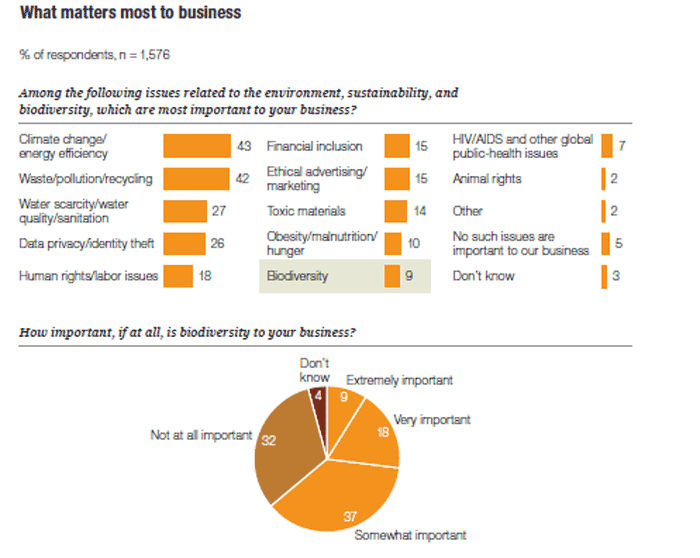To date, most environmentally sustainable supply chain initiatives have revolved around green house gas emissions and climate change, reduced water usage, lowering overall energy consumption, and reducing waste in such areas as packaging.
Now we have a new term entering the Green supply chain lexicon for company executives to be concerned about it: Biodiversity.
Biodiversity is “the next environmental issue for business,” say the researchers at the McKinsey Quarterly, which it defines as being about “the diversity of species, variety of ecosystems, and variability of genes.”
Sounds a little more complicated than reducing deadhead miles.
Given what would seem the unfamiliarity of the topic, we were surprised a McKinsey survey found 59% of the executive respondents see biodiversity as more of an opportunity than a risk for their companies. That’s up from 29% who responded that way in a similar 2007 survey.
These companies “identify a variety of potential opportunities, such as bolstering corporate reputations with environmentally conscious stakeholders by acting to preserve biodiversity and developing new products or ideas from renewable natural resources,” according to McKinsey.
There is also some conflicting data from the survey. For example, 55% of respondents said biodiversity should be somewhere among the top ten items on the corporate agenda.
However, these same respondents didn’t consider biodiversity as a high priority for action. While nearly two-thirds say biodiversity is at least somewhat important to their companies, it ranked just tenth in overall importance on a list of 12 environmental and sustainability related issues, ahead only of HIV/AIDS and animal rights (see figure below).

Source: McKinsey Quarterly
Indeed, the data seem to show a lot of overlap between climate change/energy use concerns and a biodiversity agenda, as the top responses about what actions companies are taking to promote biodiversity are all around increasing use of renewable energy resources. That tells us biodiversity is largely mixed up with overall sustainability issues in the mind of most executives.
That’s supported by the fact that “water scarcity,” a traditional environmental/sustainability issue, was at the top of the list of biodiversity concerns among respondents, with 31% citing it as having the potential to become a significant concern for their companies over the next three years. This worry was especially prominent among executives in the food and beverage industries, which are often big users of water in production processes.
But, 61% of the execs said that although threats to biodiversity are linked to climate change, addressing climate change alone won’t resolve all of the threats to the biodiversity that exist today.
Then again, many executives say their companies face little or no biodiversity risks, with 39% expecting not to face any operational risk from issues related to biodiversity over the next three years, and 34% expecting no threats from external issues such as water scarcity.
All of this leaves us at TheGreenSupplyChain.com somewhat confused, and feeling that most companies have enough on their hands managing Green supply chain and Sustainability issues already without throwing the new category of biodiversity into the mix.
But we may be proven wrong…
How big an issue is or will biodiversity be for business? Do we need it as a separate category of concerns for business to worry about? Let us know your thoughts at the Feedback button below.

TheGreenSupplyChain.com is now Twittering! Follow us at www.twitter.com/greenscm
|